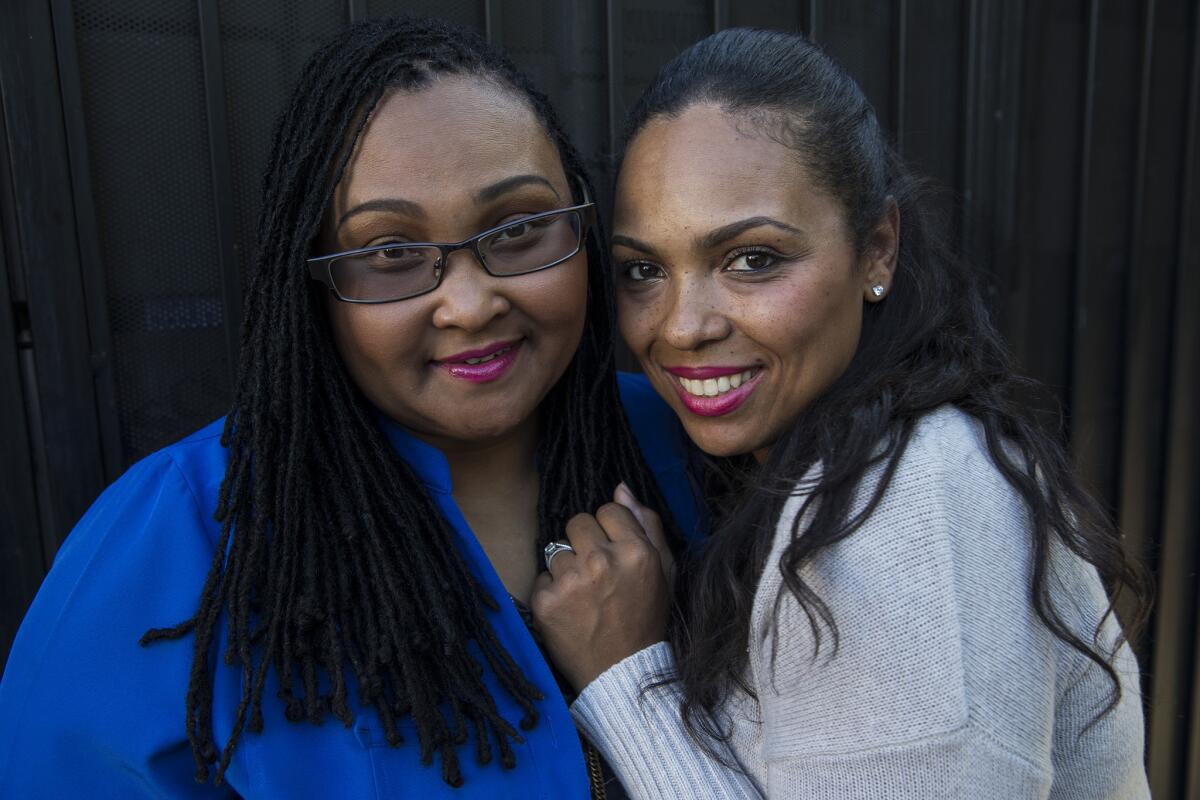Deeply personal ‘I Am Ali’ scores an intimate knockout

- Share via
When you hear the name Muhammad Ali, certain iconic images inevitably spring to mind. There’s Ali the fighter, standing over a fallen Sonny Liston after a stunning first-round knockout in 1965. There’s Ali the firebrand, declaring his refusal to serve in the Vietnam War on religious grounds in 1967. There’s Ali the showman, rhyming, at a 1974 news conference before the “Rumble in the Jungle” against George Foreman, “I murdered a rock, injured a stone, hospitalized a brick! I’m so mean, I make medicine sick!”
But for every moment in the boxing legend’s life that has played out in the glare of the spotlight, there have been many more known only to his closest friends and family.
“He took me to school all the time,” Hana Ali, 38, the seventh of Ali’s nine children, remembered with her older half sister, Maryum, 46, nicknamed May May, on a recent afternoon in L.A. “He would take his tape recorder and interview my teachers and classmates and ask if I was a good girl. He’d find out who I had a crush on and go interview that little boy. It was embarrassing.” She laughed. “He would even try to braid my hair sometimes. He was an amazing father.”
The new documentary “I Am Ali,” in theaters and on demand Oct. 10, showcases this less-known side of the boxing legend, who is now 72 and has suffered from Parkinson’s disease for more than three decades. While hardly the first film to take on Ali — there were the 2001 biopic “Ali,” starring Will Smith, and the Oscar-winning 1996 documentary “When We Were Kings,” to name just two others — “I Am Ali” offers what may be the most intimate look at his life yet seen onscreen, fashioning a portrait of Ali as not just a globally renowned sports hero but as a father, friend, husband and brother.
The film recounts the three-time world heavyweight champion’s life story through interviews with family members (including ex-wife Veronica Porsche and brother Rahman), colleagues (including longtime business manager Gene Kilroy) and rivals (including Foreman) and, most poignantly, by utilizing never-heard-before private audio recordings Ali himself made over the years.
May May Ali, the eldest of Ali’s children from his four marriages, said although she has participated in a number of Ali documentaries, this one stands apart for how personal it is.
“Ali docs are always good because he’s a great subject,” she said. “But with this one, I was like, ‘Wow, that’s a whole different angle and different feel.’ The father side has never been told. People just overlooked it.”
For years, Ali made his own recordings of conversations with his family, of his telephone calls and his travels, preserving moments from what he knew was an extraordinary life for posterity.
“My father always said, ‘Life is fleeting,’” said May May Ali, who is a social worker. “He was fascinated by time, and he wanted to capture it.”
Although the whereabouts of many of the recordings are unknown, 80 to 90 hours of them ended up in Hana Ali’s possession, most of them micro-cassette tapes carefully labeled in her father’s handwriting. Hana Ali, who works with autistic children, has held many of the recordings back for a book she is writing about her father, but after talking with “I Am Ali” director Clare Lewins over a period of months, she eventually allowed the British filmmaker to use a number of them in the documentary.
“It took a process of about a year for Hana to trust me to release these snippets,” said Lewins, who is making her feature debut, having directed documentaries on prominent public figures for the BBC. “She adores her father, and they’re very precious to her.”
Indeed, with the once-garrulous, famously quotable Ali now all but silenced because of his illness, these audio recordings of unguarded moments bantering with his kids or chatting on the phone, most dating from the 1970s, seem even more precious than they otherwise might.
“Ali was so unbelievably articulate and funny and bright, for him not to be able to speak to the world now is a double whammy,” Lewins said. “To hear him in these tapes, it’s almost like he’s telling his own story.”
While Ali’s illness prevented him from participating in the documentary, Hana Ali said her father, who now lives in Scottsdale, Ariz., with his wife, Lonnie, gave it his full blessing.
“I called him today and talked to him about it — I make a point to call him in the morning because he’s at his best then, and you can hear him clearly,” she said. “He knows he’s important. He knows he’s impacted people in the world. But at the same time, he’s humble. When he sees himself on TV, he says, ‘They still remember me?’ I say, ‘Are you kidding, Daddy? They’ll always remember you.’”
Follow me on Twitter: @joshrottenberg
More to Read
Only good movies
Get the Indie Focus newsletter, Mark Olsen's weekly guide to the world of cinema.
You may occasionally receive promotional content from the Los Angeles Times.







